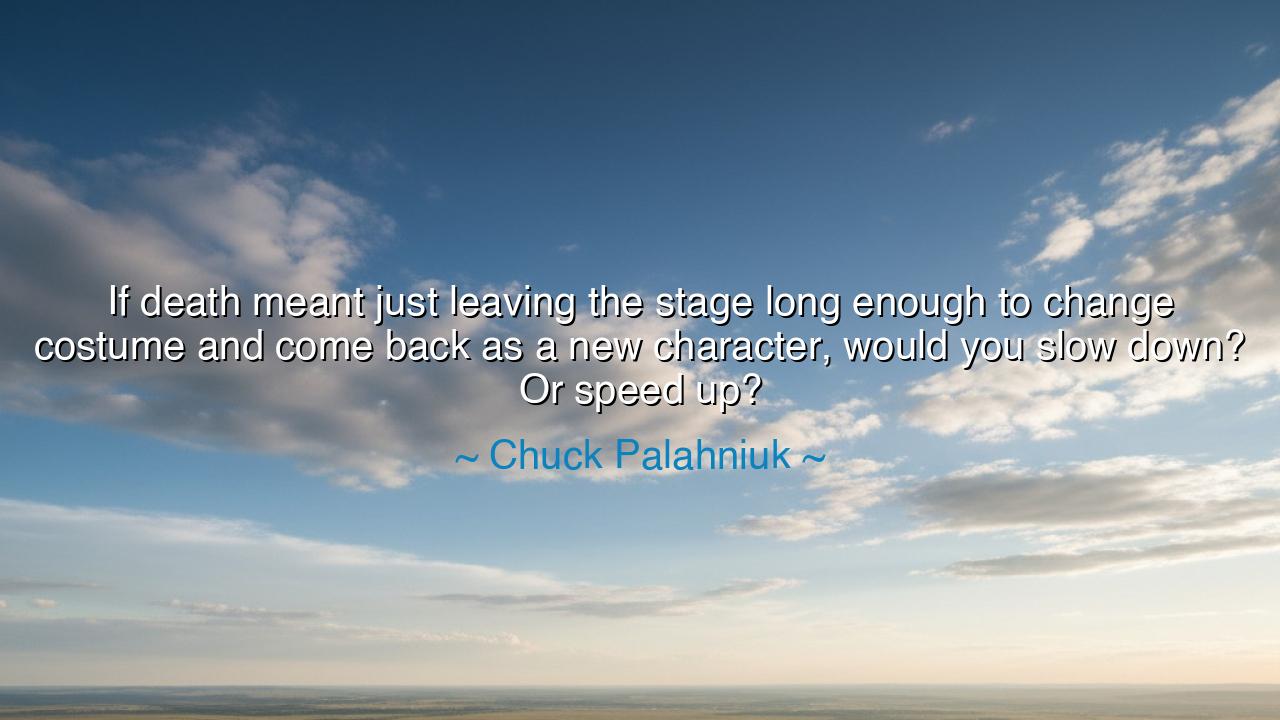
If death meant just leaving the stage long enough to change
If death meant just leaving the stage long enough to change costume and come back as a new character, would you slow down? Or speed up?






“If death meant just leaving the stage long enough to change costume and come back as a new character, would you slow down? Or speed up?” Thus spoke Chuck Palahniuk, the modern philosopher cloaked in the guise of a novelist. In this question, he pierces through humanity’s deepest fear — the mystery of death — and transforms it into something strangely intimate, almost playful. What if, he asks, death were not an end, but merely a pause — a brief intermission before the soul returns to the stage of existence in a different form? What if the grave were not the curtain, but the changing room? Would you move through life with more caution, or would you embrace every act with greater fervor, knowing that the play goes on?
The origin of this quote lies in Palahniuk’s enduring fascination with mortality and transformation. Known for his unflinching reflections on the human condition, he often blurs the line between the grotesque and the profound. In this saying, he presents death as theater, a metaphor that echoes ancient beliefs — from the Greek philosophers who saw the world as a cosmic drama, to the Buddhists who viewed life and death as cycles of reincarnation. To Palahniuk, this metaphor is not meant to soothe but to awaken. It challenges us to reconsider how we live, to confront whether our fear of death has made us too timid to live at all.
When he asks whether we would “slow down or speed up,” he is, in truth, asking whether we have understood the urgency of life. If death is but a costume change, then perhaps we need not fear it — but if life itself is the performance, every moment matters. Each day becomes a scene that cannot be repeated, every word a line that echoes beyond its speaking. Should we rush to experience everything before the curtain falls, or should we move slowly, savoring each moment as a sacred part of the play? The wisdom of the ancients tells us that both impulses are true. For as Heraclitus said, “The way up and the way down are one and the same.” Life is both swift and eternal — fleeting in its moments, endless in its essence.
Consider the example of Socrates, who, when condemned to death, spoke calmly of his departure. “To fear death,” he said, “is to think oneself wise when one is not — to think we know what we do not.” To him, death was not destruction, but transition. He drank the hemlock with serenity, believing that he was simply stepping into another form of being, another chapter of the eternal play. In this, Socrates answered Palahniuk’s question with action: he did not slow down in fear, nor race in desperation; he lived each act with integrity, knowing that the next would come when it was meant to.
Yet the modern mind, estranged from mystery, trembles at the thought of endings. We rush to fill our lives with noise and motion, or cling to safety and routine, pretending that the play will never end. Palahniuk’s question shatters that illusion. If death is merely a pause, then the meaning of life is not in its duration, but in its intensity. The soul that plays its part fully, fearlessly, passionately, leaves the stage not in regret but in triumph. To fear death is to forget that the same hand that writes the ending also writes the beginning. And so, the wise do not run from death, nor do they chase it; they walk toward it with grace, knowing that to live well is to die well.
In a way, this idea mirrors the teachings of the Bhagavad Gita, where Krishna tells Arjuna that the soul cannot be slain — that death is but a shedding of the body, as one removes an old garment to don another. “The wise grieve not for the living nor the dead,” he says. This vision — echoed in Palahniuk’s question — calls us to live without paralysis, to act with courage, for the eternal self cannot truly perish. Life and death are not opposites; they are partners in an infinite dance.
The lesson, then, is profound: live as if life were a divine performance — not for applause, but for truth. Do not fear the end, for it is but a transformation, a passage from one act to another. Fill your role with meaning, speak your lines with heart, and when the time comes to exit, do so with dignity, knowing you gave your all. And when the curtain rises again — whether in another life, another body, or another form of being — carry forward the wisdom you have earned.
So, remember the words of Chuck Palahniuk: if death were only a costume change, would you slow down, or would you speed up? The choice lies not in how long you live, but in how deeply. Do not waste the stage with hesitation. Let your every step, every word, every breath be a testament to your awareness that all of this — the laughter, the pain, the love, the loss — is one vast and sacred play. And when the time comes to change costumes, step behind the curtain not in fear, but in wonder — ready, once again, for your next great role.






AAdministratorAdministrator
Welcome, honored guests. Please leave a comment, we will respond soon